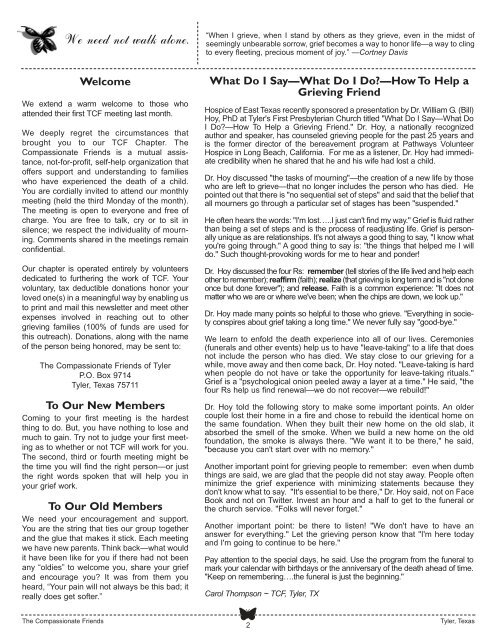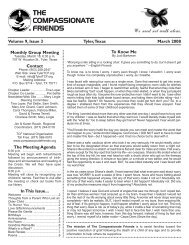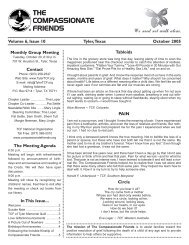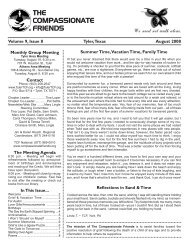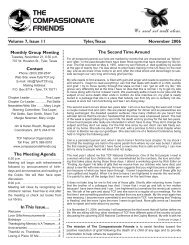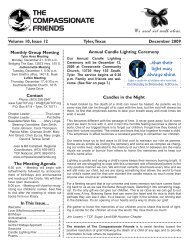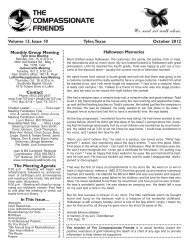December 2010 - The Compassionate Friends of Tyler
December 2010 - The Compassionate Friends of Tyler
December 2010 - The Compassionate Friends of Tyler
You also want an ePaper? Increase the reach of your titles
YUMPU automatically turns print PDFs into web optimized ePapers that Google loves.
We need not walk alone.<br />
Welcome<br />
We extend a warm welcome to those who<br />
attended their first TCF meeting last month.<br />
We deeply regret the circumstances that<br />
brought you to our TCF Chapter. <strong>The</strong><br />
<strong>Compassionate</strong> <strong>Friends</strong> is a mutual assistance,<br />
not-for-pr<strong>of</strong>it, self-help organization that<br />
<strong>of</strong>fers support and understanding to families<br />
who have experienced the death <strong>of</strong> a child.<br />
You are cordially invited to attend our monthly<br />
meeting (held the third Monday <strong>of</strong> the month).<br />
<strong>The</strong> meeting is open to everyone and free <strong>of</strong><br />
charge. You are free to talk, cry or to sit in<br />
silence; we respect the individuality <strong>of</strong> mourning.<br />
Comments shared in the meetings remain<br />
confidential.<br />
Our chapter is operated entirely by volunteers<br />
dedicated to furthering the work <strong>of</strong> TCF. Your<br />
voluntary, tax deductible donations honor your<br />
loved one(s) in a meaningful way by enabling us<br />
to print and mail this newsletter and meet other<br />
expenses involved in reaching out to other<br />
grieving families (100% <strong>of</strong> funds are used for<br />
this outreach). Donations, along with the name<br />
<strong>of</strong> the person being honored, may be sent to:<br />
<strong>The</strong> <strong>Compassionate</strong> <strong>Friends</strong> <strong>of</strong> <strong>Tyler</strong><br />
P.O. Box 9714<br />
<strong>Tyler</strong>, Texas 75711<br />
To Our New Members<br />
Coming to your first meeting is the hardest<br />
thing to do. But, you have nothing to lose and<br />
much to gain. Try not to judge your first meeting<br />
as to whether or not TCF will work for you.<br />
<strong>The</strong> second, third or fourth meeting might be<br />
the time you will find the right person—or just<br />
the right words spoken that will help you in<br />
your grief work.<br />
To Our Old Members<br />
We need your encouragement and support.<br />
You are the string that ties our group together<br />
and the glue that makes it stick. Each meeting<br />
we have new parents. Think back—what would<br />
it have been like for you if there had not been<br />
any “oldies” to welcome you, share your grief<br />
and encourage you? It was from them you<br />
heard, “Your pain will not always be this bad; it<br />
really does get s<strong>of</strong>ter.”<br />
“When I grieve, when I stand by others as they grieve, even in the midst <strong>of</strong><br />
seemingly unbearable sorrow, grief becomes a way to honor life—a way to cling<br />
to every fleeting, precious moment <strong>of</strong> joy.” —Cortney Davis<br />
What Do I Say—What Do I Do?—How To Help a<br />
Grieving Friend<br />
Hospice <strong>of</strong> East Texas recently sponsored a presentation by Dr. William G. (Bill)<br />
Hoy, PhD at <strong>Tyler</strong>'s First Presbyterian Church titled "What Do I Say—What Do<br />
I Do?—How To Help a Grieving Friend." Dr. Hoy, a nationally recognized<br />
author and speaker, has counseled grieving people for the past 25 years and<br />
is the former director <strong>of</strong> the bereavement program at Pathways Volunteer<br />
Hospice in Long Beach, California. For me as a listener, Dr. Hoy had immediate<br />
credibility when he shared that he and his wife had lost a child.<br />
Dr. Hoy discussed "the tasks <strong>of</strong> mourning"—the creation <strong>of</strong> a new life by those<br />
who are left to grieve—that no longer includes the person who has died. He<br />
pointed out that there is "no sequential set <strong>of</strong> steps" and said that the belief that<br />
all mourners go through a particular set <strong>of</strong> stages has been "suspended."<br />
He <strong>of</strong>ten hears the words: "I'm lost…..I just can't find my way." Grief is fluid rather<br />
than being a set <strong>of</strong> steps and is the process <strong>of</strong> readjusting life. Grief is personally<br />
unique as are relationships. It's not always a good thing to say, "I know what<br />
you're going through." A good thing to say is: "the things that helped me I will<br />
do." Such thought-provoking words for me to hear and ponder!<br />
Dr. Hoy discussed the four Rs: remember (tell stories <strong>of</strong> the life lived and help each<br />
other to remember); reaffirm (faith); realize (that grieving is long term and is "not done<br />
once but done forever"); and release. Faith is a common experience: "It does not<br />
matter who we are or where we've been; when the chips are down, we look up."<br />
Dr. Hoy made many points so helpful to those who grieve. "Everything in society<br />
conspires about grief taking a long time." We never fully say "good-bye."<br />
We learn to enfold the death experience into all <strong>of</strong> our lives. Ceremonies<br />
(funerals and other events) help us to have "leave-taking" to a life that does<br />
not include the person who has died. We stay close to our grieving for a<br />
while, move away and then come back, Dr. Hoy noted. "Leave-taking is hard<br />
when people do not have or take the opportunity for leave-taking rituals."<br />
Grief is a "psychological onion peeled away a layer at a time." He said, "the<br />
four Rs help us find renewal—we do not recover—we rebuild!"<br />
Dr. Hoy told the following story to make some important points. An older<br />
couple lost their home in a fire and chose to rebuild the identical home on<br />
the same foundation. When they built their new home on the old slab, it<br />
absorbed the smell <strong>of</strong> the smoke. When we build a new home on the old<br />
foundation, the smoke is always there. "We want it to be there," he said,<br />
"because you can't start over with no memory."<br />
Another important point for grieving people to remember: even when dumb<br />
things are said, we are glad that the people did not stay away. People <strong>of</strong>ten<br />
minimize the grief experience with minimizing statements because they<br />
don't know what to say. "It's essential to be there," Dr. Hoy said, not on Face<br />
Book and not on Twitter. Invest an hour and a half to get to the funeral or<br />
the church service. "Folks will never forget."<br />
Another important point: be there to listen! "We don't have to have an<br />
answer for everything." Let the grieving person know that "I'm here today<br />
and I'm going to continue to be here."<br />
Pay attention to the special days, he said. Use the program from the funeral to<br />
mark your calendar with birthdays or the anniversary <strong>of</strong> the death ahead <strong>of</strong> time.<br />
"Keep on remembering….the funeral is just the beginning."<br />
Carol Thompson ~ TCF, <strong>Tyler</strong>, TX<br />
<strong>The</strong> <strong>Compassionate</strong> <strong>Friends</strong><br />
L<br />
2<br />
<strong>Tyler</strong>, Texas


